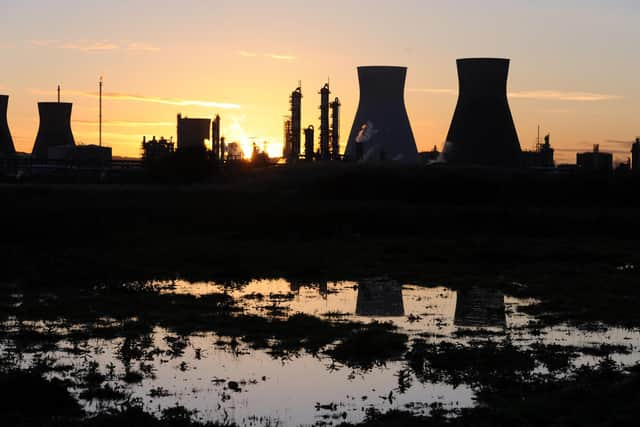Grangemouth’s switch to hydrogen could play a key role in the UK’s journey to net zero, according to the National Grid
and live on Freeview channel 276
As the UK takes action towards achieving a clean energy future, Grangemouth has a significant role to play and could be one of the first regions to reap the benefits.
The UK government has outlined ambitious plans and funding to reduce carbon emissions which includes investing more than £1 billion to unlock the potential of hydrogen and support the establishment of carbon capture,
Advertisement
Hide AdAdvertisement
Hide Adutilisation and storage (CCUS) in four industrial clusters. Accounting for almost 30 per cent of industrial emissions in Scotland and as Scotland’s largest port, Grangemouth’s transition to greener gasses will be critical to this.


To make progress on climate change ambitions, we need to pick up the pace of reducing carbon emissions.
Falkirk Council is putting climate change and carbon reduction measures at the heart of its post-pandemic transformation programme, and National Grid plans to look at how we can convert existing pipes in and around Grangemouth to carry hydrogen rather than methane gas is key to this. We can then link the pipes between Grangemouth, Teesside, Humberside, Southampton, the North West and South Wales, to create a UK hydrogen backbone, repurposing around 2000km of the current network (around 25 per cent), speeding up the rollout of hydrogen across the country and driving down carbon emissions.
The backbone could transport at least a quarter of current gas demand in Great Britain today and supports government plans of producing five gigawatts of low carbon hydrogen by 2030, providing the vital storage and resilience needed to unlock the full potential of hydrogen. There’s also the added potential of connecting the backbone up with Europe via our interconnectors at Bacton.
Advertisement
Hide AdAdvertisement
Hide AdHaving the ability to import and export hydrogen across these pipelines will strengthen UK energy supply providing more flexibility to manage peaks in demand.


Developing the backbone will take time with significant modelling, engineering and assessment needed to determine different route options to transport hydrogen between clusters. Finding a way to move hydrogen around the country could help decarbonise industry, commercial, and even residential areas that sit between Grangemouth and the other cluster locations - instead of limiting hydrogen to individual cluster regions, we can form a hydrogen network which could eventually power other industries and towns including Falkirk along the route.
To make the backbone a reality and reap the benefits we need to look at the network and define where there’s scope for conversion. National Grid will commence this evaluation in Scotland as part of the Scottish Net Zero Infrastructure (SNZI) programme which received funding from the UKRI last week. Our contribution to the wider Acorn project will be to review if there’s potential to reuse pipelines in the region, to free up capacity for hydrogen or CO2 transfer.
In the midst of objectives to build back better and achieve a green economic recovery, creating a hydrogen backbone which leverages industrial centres like Grangemouth could bring economic benefits too. According to the Hydrogen Taskforce, hydrogen production could generate £18bn for the UK economy and support more than 75,000 jobs over the next 15 years.
Advertisement
Hide AdAdvertisement
Hide AdAs we look ahead to the next decade and beyond, decarbonising Grangemouth not only signals jobs and growth prospects, but also a longer-term commitment to the region and its key role in achieving a greener future.
Antony Green, Project Director for Hydrogen at National Grid